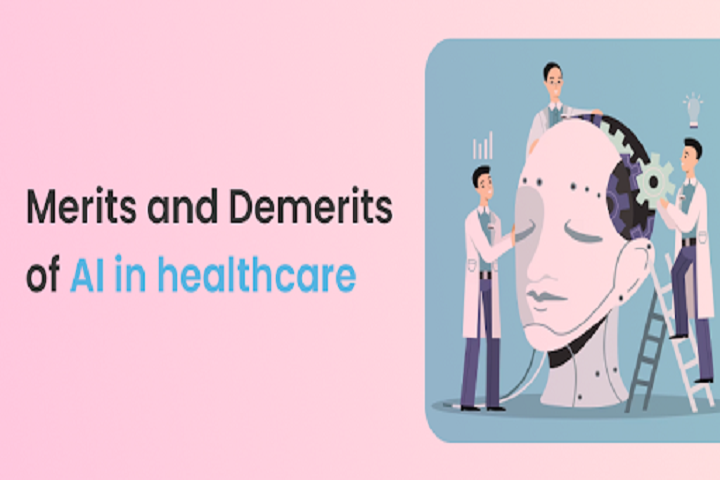Artificial Intelligence (AI) has emerged as a transformative force in various industries, including healthcare. Its applications in this field have led to remarkable advancements and improvements in patient care, diagnosis, and treatment. However, like any technology, AI in healthcare comes with its own set of merits and demerits.
The Artificial Intelligence Courseon Healthcare explores the merits of AI in revolutionizing medical diagnosis and treatment, while also addressing the potential demerits, such as concerns over data privacy and the need for careful validation of AI-driven healthcare solutions.
In this article, we will explore the advantages and disadvantages of AI in the healthcare sector, shedding light on its potential benefits and challenges.
Merits of AI in Healthcare:
Enhanced Medical Diagnosis:
AI systems have demonstrated exceptional capabilities in medical diagnosis. With machine learning algorithms and deep learning models, AI can analyze vast amounts of patient data, including symptoms, medical history, and imaging results, to identify potential diseases and conditions with high accuracy. This can lead to earlier detection and timely intervention, increasing the chances of successful treatment.
AI’s ability to analyze intricate patterns in data enables it to discern connections that human practitioners may overlook, thus aiding in more precise and early diagnoses. This is particularly valuable in identifying conditions with ambiguous symptoms or rare diseases that may initially present themselves as more common ailments.
Personalized Treatment Plans:
By analyzing individual patient data, AI can create personalized treatment plans tailored to each patient’s unique needs and characteristics. This level of personalization can optimize treatment outcomes and reduce the risk of adverse reactions to medications, as well as enhance patient satisfaction.
Personalized medicine, made possible by AI, offers tremendous potential in optimizing treatments, dosage regimens, and therapies for individual patients. This approach takes into account genetic, environmental, and lifestyle factors to tailor treatments that are most effective and least harmful to each patient, maximizing the likelihood of a positive outcome.
Predictive Analytics for Preventive Care:
AI can analyze patient data and identify patterns that may predict the likelihood of specific health issues. This enables healthcare providers to intervene proactively and offer preventive care, potentially reducing the occurrence of chronic diseases and improving overall public health.
AI-driven predictive analytics can analyze large datasets to identify risk factors and early warning signs associated with certain diseases. This empowers healthcare professionals to implement targeted interventions, health education campaigns, and lifestyle modifications to mitigate the risk of diseases, reducing the burden on the healthcare system and improving the population’s well-being.
Efficient Administrative Tasks:
AI-powered systems can automate and streamline administrative tasks, such as appointment scheduling, medical billing, and record-keeping. This not only reduces the workload on healthcare professionals but also minimizes the chances of errors and delays, leading to improved efficiency and cost savings.
The automation of administrative tasks through AI not only improves operational efficiency but also frees up valuable time for healthcare providers to focus on patient care and clinical decision-making. This can result in better patient outcomes and a more satisfying work environment for healthcare professionals.
Drug Discovery and Development:
AI has revolutionized the drug discovery process by significantly speeding up the identification of potential drug candidates and predicting their efficacy. This can accelerate the development of new medications and therapies, providing hope for patients with previously untreatable conditions.
Through AI-driven drug discovery, researchers can analyze vast databases of molecular structures and biological data to identify potential drug targets and compounds. This expedites the identification of promising candidates for further testing, shortening the time and cost required for drug development.
Virtual Health Assistants:
AI-powered virtual health assistants can engage with patients, offer medical advice, and answer general health-related queries. These virtual assistants can be available 24/7, making healthcare information and support more accessible to patients, particularly in remote or underserved areas.
Virtual health assistants powered by AI can provide patients with immediate access to accurate medical information, symptom assessment, and self-care guidance. This empowers patients to take an active role in managing their health and can reduce unnecessary visits to healthcare facilities for minor concerns.
Demerits of AI in Healthcare:
Data Privacy and Security Concerns:
AI in healthcare relies heavily on sensitive patient data, making data privacy and security a major concern. Unauthorized access to medical records or AI systems can lead to breaches of confidentiality, potentially harming patients and eroding trust in the healthcare system.
The vast amount of data involved in AI applications can attract malicious actors seeking to exploit vulnerabilities in systems to gain unauthorized access to patient records or disrupt healthcare operations. Protecting patient privacy and maintaining robust data security protocols are crucial to prevent potential breaches.
Limited Generalization of AI Models:
AI models are trained on specific datasets, and their accuracy may diminish when applied to a different population or geographical region. This can result in misdiagnoses or inadequate treatment recommendations, particularly for patients with rare conditions or atypical symptoms.
AI models trained on data from a specific demographic or geographic region may not be fully applicable to other populations with different genetic, environmental, or lifestyle factors. Therefore, continuous validation and calibration of AI models are necessary to ensure their accuracy and generalizability.
Ethical and Legal Challenges:
The use of AI in healthcare raises ethical questions regarding the accountability of decisions made by AI systems. In cases of medical errors or malpractice, it becomes challenging to assign responsibility, leading to potential legal implications.
AI algorithms often work as “black boxes,” meaning that their decision-making process is not easily interpretable by humans. This lack of transparency can raise ethical concerns about how AI-generated recommendations or decisions are made and whether they align with established medical ethics and standards.
Cost and Implementation:
Adopting AI technologies in healthcare can be financially demanding, especially for smaller healthcare facilities with limited resources. Integrating AI into existing healthcare systems and training healthcare personnel to effectively use AI tools can also be time-consuming and costly.
While the potential benefits of AI in healthcare are substantial, the initial investment required to implement AI systems and the ongoing maintenance costs may present challenges for some healthcare institutions. Ensuring cost-effectiveness and demonstrating a positive return on investment will be critical for wider AI adoption.
Bias and Fairness:
AI algorithms are only as unbiased as the data they are trained on. If historical data contains biases, AI models may perpetuate and amplify these biases, leading to disparities in healthcare outcomes across different demographic groups.
Biased AI models can inadvertently perpetuate inequalities in healthcare by providing suboptimal care or misdiagnosing certain populations. Addressing bias in AI requires careful data curation, diverse representation in training data, and rigorous evaluation to ensure that AI systems are fair and equitable for all patients.
Watch this Artficial Intelligence Training video to learn more about AI.
Conclusion:
AI has undoubtedly brought remarkable advancements to the healthcare industry, revolutionizing the way medical diagnosis, treatment, and patient care are delivered. The merits of AI in healthcare, such as improved diagnosis accuracy, personalized treatment plans, and predictive analytics for preventive care, promise to enhance patient outcomes and overall public health.
However, it is crucial to address the demerits of AI in healthcare, including data privacy concerns, the potential lack of human touch, and ethical challenges. Healthcare professionals and policymakers must work collaboratively to strike a balance between adopting AI technologies to improve patient care and addressing the associated risks and challenges responsibly.






